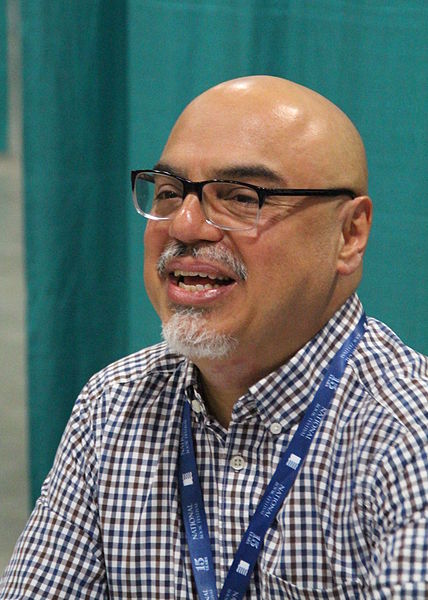- 14 3402-5578
- Rua Hygino Muzy Filho, 737, MARÍLIA - SP
- contato@latinoobservatory.org
 Foto: fourandsixty
Foto: fourandsixty
Héctor Tobar (born 1963, Los Angeles) is a Los Angeles-based author and journalist whose work examines the interdependent and evolving relationship between Latin America and the United States.
Tobar is the son of Guatemalan immigrants. His long career in journalism includes working for The New Yorker, LA Weekly and many positions at the Los Angeles Times. He was a Metro columnist for The Times, a book critic, and the paper’s bureau chief in Mexico City and Buenos Aires, Argentina. He also worked for several years as a National Correspondent for Latino Affairs. In addition, Tobar contributed to the newspaper's Pulitzer Prize-winning coverage of the Los Angeles riots in 1992. He is a graduate of the University of California, Santa Cruz, and the MFA program in Creative Writing at the University of California, Irvine.
Tobar is the author of The Tattooed Soldier, a novel set in the impoverished immigrant neighborhoods of Los Angeles in the weeks before the riots and in Guatemala during the years of military dictatorship. His nonfiction Translation Nation: Defining a New American Identity in Spanish-Speaking America, is a cross-country journey with stops at many of the new places where Latin American immigrants are settling, including Rupert, Idaho, Grand Island, Nebraska, and Memphis, Tennessee. His third book, The Barbarian Nurseries, is a sweeping novel about ethnic and class conflicts in modern Southern California: it was named a New York Times Outstanding Book in 2011 and won the 2012 California Book Award gold medal for fiction.
In 2006, Tobar was named one of the 100 most influential Hispanics in the United States by Hispanic Business magazine.
During the Copiapó mining accident in 2010, still trapped in the mine, the 33 miners chose to collectively hire a single author to write an official story so that none of the 33 could individually profit from the experiences of the others. The miners chose Héctor Tobar, who then had exclusive access to the miners' stories. In October 2014, he published an official report titled Deep Down Dark: The Untold Stories of 33 Men Buried in a Chilean Mine, and the Miracle That Set Them Free. It was a finalist for the 2014 National Book Critics Circle Award (general nonfiction). His 2020 novel, The Last Great Road Bumé, is a fictionalized account of the life of Joe Sanderson, an adventurer from Urbana, Illinois, who was one of two Americans to die fighting leftist rebels in El Salvador.
Tobar has been an adjunct professor at Loyola Marymount University and Pomona College, was an assistant professor at the University of Oregon’s school of journalism and communication and is currently an associate professor at the University of California, Irvine.
Tobar’s The Tattooed Soldier was published in 1998. Eric Vázquez in Interrogative Justice in Hector Tobar’s The Tattooed Soldier writes of this: Much of this scholarship emphasizes the novel’s pertinence to a demand for [U.S.] representation of the Central American diaspora. Consequently, by adopting cultural recognition as a precept, these Latin literary critics often interpret the novel as an allegory of the diaspora’s success or failure in gaining recognition and inclusion within broader politics. For the critic and novelist Arturo Arias, the novel and its characters express the null space of Central American cultural and social identity within American multiculturalism. This interpretation of the novel reflects the valuable implications it brings to the Central American community.
Awards:
2011: Winner of the California Book Awards Gold
Medal for The Barbarian Nurseries.
2014: California Book Awards Silver Medal
Nonfiction winner for Deep Down Dark.











